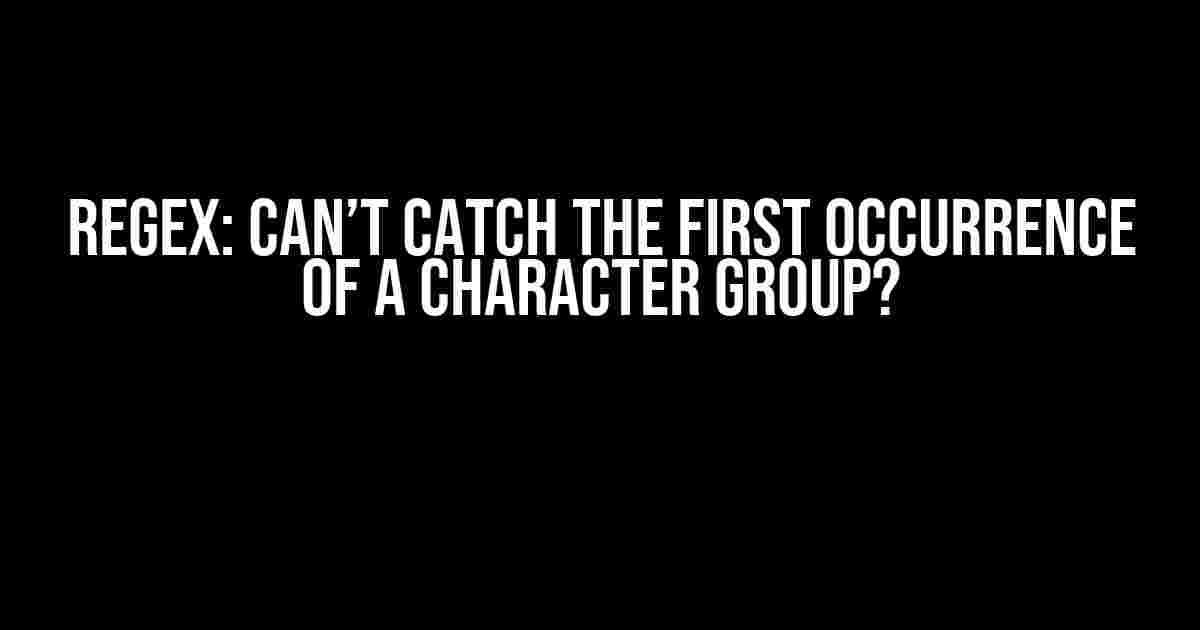If you’re reading this, chances are you’re stuck in a regex rut, trying to catch the first occurrence of a character group but to no avail. Fear not, dear regex enthusiast, for we’re about to embark on a thrilling adventure to conquer this pesky problem together!
What’s the Issue?
Let’s say you’re dealing with a string like this:
"hello world, foo, bar, baz"
And you want to catch the first occurrence of the comma (`,`) followed by a space (“) and a word character (“\w“) using regex. Sounds simple, right? Wrong! The regex pattern you might come up with, like `,/ \w+`, will match all occurrences, not just the first one.
Why Does This Happen?
It’s because regex engines are greedy by default. They’ll match as many characters as possible, which means they’ll keep matching until they reach the end of the string. To avoid this, we need to make our regex pattern lazy, so it stops matching as soon as it finds the first occurrence.
Solution 1: Positive Lookahead
One way to catch the first occurrence is by using a positive lookahead. This technique allows us to assert that a pattern exists without including it in the match.
(?=, \w+).*?(, \w+)
Here’s what’s happening:
- `(?=, \w+)` is a positive lookahead that asserts the presence of a comma, a space, and a word character.
- `.*?` matches any characters (except newline) lazily, stopping as soon as it finds the first occurrence.
- (, \w+) is the actual match we’re interested in.
This solution works, but it’s a bit convoluted. Let’s explore another approach.
Solution 2: Negative Lookahead
Another way to tackle this is by using a negative lookahead. This technique allows us to assert that a pattern does not exist.
(?!.*?, \w+)(, \w+)
Here’s what’s happening:
- (?!.*?, \w+) is a negative lookahead that asserts that there are no more occurrences of a comma, a space, and a word character.
- (, \w+) is the actual match we’re interested in.
This solution is more elegant, but it can still get messy for more complex patterns.
Solution 3: Anchors and Grouping
My personal favorite approach is to use anchors and grouping. This method is more straightforward and easier to maintain.
^([^,]+, \w+)
Here’s what’s happening:
- `^` is the start of the string anchor, ensuring we match from the beginning.
- `([^,]+, \w+)` is a capturing group that matches one or more characters that are not commas, followed by a comma, a space, and a word character.
This solution is concise and efficient. By using the start of the string anchor, we can ensure that we only match the first occurrence.
Conclusion
Catching the first occurrence of a character group using regex can be a challenge, but with the right techniques, it’s achievable. Whether you use positive lookahead, negative lookahead, or anchors and grouping, the key is to be lazy and specific in your pattern matching.
Remember, practice makes perfect, so be sure to try out these solutions with different test strings and regex flavors (JavaScript, Python, Java, etc.). Happy regex-ing!
Bonus: Common Pitfalls
Here are some common mistakes to avoid when trying to catch the first occurrence of a character group:
| Mistake | Why It Fails |
|---|---|
| , \w+ | Matches all occurrences, not just the first one. |
| (, \w+)* | Matches zero or more occurrences, not just the first one. |
| (, \w+){1} | Matches exactly one occurrence, but not necessarily the first one. |
Avoid these common mistakes, and you’ll be well on your way to regex mastery!
Regex Resources
Want to dive deeper into the world of regex? Here are some excellent resources to get you started:
- Regex101: An online regex tester and debugger.
- Regexr: A comprehensive regex reference and tutorial.
- Mastering Regular Expressions: A book by Jeffrey E.F. Friedl.
Stay curious, stay lazy (in your regex patterns), and happy coding!
Frequently Asked Question
Get ready to conquer the world of regex with our expert answers to your most pressing questions!
Why can’t I catch the first occurrence of a character group using regex?
Hey there, regex rookie! This is because regex engines are greedy by default, meaning they’ll match as many characters as possible. To catch the first occurrence, you can use the `?` quantifier after your character group to make it lazy, like this: `.*?(pattern)`. This tells the engine to match as few characters as possible before finding your pattern.
How do I match a character group at the start of a string?
Easy peasy! To match a character group at the start of a string, use the `^` anchor, like this: `^(pattern)`. The `^` symbol tells the regex engine to start matching from the beginning of the string.
Can I use regex to match a character group only if it’s followed by another specific pattern?
You bet! This is where lookahead assertions come in. Use a positive lookahead, like this: `(?=pattern)`, to ensure that your character group is followed by the desired pattern. For example: `(?=foo)bar` would match the string “bar” only if it’s followed by “foo”.
What’s the difference between a character class and a character group in regex?
Excellent question! A character class is a set of characters inside square brackets `[]`, like `[abc]`, which matches any single character within the set. A character group, on the other hand, is a set of characters or patterns grouped together using parentheses`()`, like `(abc|def)`, which matches either “abc” or “def” as a whole.
How do I match all occurrences of a character group in a string, not just the first one?
To match all occurrences, use the `g` flag at the end of your regex pattern, like this: `/pattern/g`. This tells the regex engine to find all matches in the string, not just the first one. Note that the `g` flag is specific to JavaScript; in other languages, you might need to use a loop or the `findall` method.
